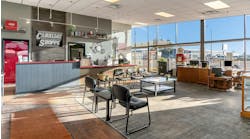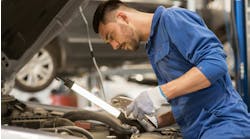You’re walking out of the grocery store, with children and $100 worth of groceries in tow. It’s been a long trip, you waited in a lengthy checkout line, you’re ready to get home—and the last thing you see is this man, walking up to you, asking to take your photo.
But this man isn’t looking to solicit. In fact, you’ll quickly take to Dennis Gair and gladly allow him to snap your photo because he’s nice, respectable and, to your surprise, offers to pay for your $100 bill.
You’re one of the many grocery shoppers Gair, body shop manager for Gatorland Toyota in Gainesville, Fla., will stop that day. And while it’s a kind deed he happily performs, Gair has a very pointed, business-minded purpose for paying for your groceries.
Based on the Gatorland Toyota body shop’s average CSI score of 97 percent and rampant growth during Gair’s first nine years of management, his ever-growing list of philanthropic community work is paying off: Pulling in $300,000 per month in 2007, the body shop is now a powerhouse that’s grown each year and is on pace to achieve $7 million in annual revenue for 2016.
And for 2017? He’s aiming for $9 million.
But Gair doesn’t just perform grassroots marketing for business growth—he does it out of necessity. With family-owned, publicly trusted independent collision centers thriving in Gainesville and the dealership body shop image spiraling downward, Gair realized nine years ago that his team needed to combat the dealer stereotype and become known as the community collision center.
On to Gatorland
Born and raised in Detroit, Gair can’t remember a time that his life didn’t revolve around cars. After years of poring over magazines and books, teaching himself how to fix dents and paint vehicles, he moved to Fort Lauderdale, Fla., where he, perhaps ironically, opened his own independent collision repair shop.
Gair did everything. From greeting customers to writing estimates to fixing vehicles, the level of attention he gave to both his craft and clientele allowed his small business to modestly thrive for six years. And Gair wanted to take those customer service skills and transfer them to a larger setting—a dealer setting.
After selling the shop to his brother, Gair slowly worked his way through several dealer body shops before reaching Gatorland Toyota in 2007.
Fighting the Stigma
On the surface, the shop never struggled, per se, performing $3.6 million in annual revenue when Gair arrived nine years ago, thanks in large part to Gatorland hosting Nationwide’s national call center, which brings in millions in direct-repair work. But as someone who’s viewed the industry through both an independent and dealer body shop, Gair isn’t blind to the customer’s perception of the latter and knew his shop was inherently coupled with an image problem.
“One of the reasons I feel that the dealerships have such a bad reputation is three quarters of them don’t want body shops,” he says. “For many years, they’ve been that dark, dusty place in the back. I’m fortunate enough to work for a company that places us in the front.”
Gair came to Gatorland right when dealership body shops were experiencing a historically bad stretch—the number of dealership-owned collision repair centers declined by 33 percent from 2006 to 2010, according to industry research and consulting firm The Romans Group LLC—and Gatorland was no exception. The shop was weighed down by low efficiency numbers and a high sublet and comeback rate.
While much of what Gair did once taking over—which included an overhaul of the shop’s blueprinting process, streamlining the estimating process and offering more competitive pay plans—went on to solve those issues, there was one intangible problem he couldn’t immediately shake: Gatorland exemplified the stigma associated with dealerships offering poor quality.
And in Gainesville, Gair claims the dealership stereotype is worse than most.
“They’re nasty and dirty, and you won’t get a good job out of them,” he says. “There is one in this town that does a decent job. But the others, we constantly have to fix their work and they shouldn’t be open. You can’t produce that kind of product all day long and have it not get around.”
“In this town, we have especially good indies,” he adds. “They’re family-run, third-generation shops. Dealers can fund bad body shops, but indies are forced to turn out good work or they’ll go out of business.”
Because of it, Gair says the shop missed out on its share of the market—which led to a creative grassroots effort to reach potential customers in the community. And he did it in three ways:
Supermarket Sweep
Gair attributes the body shop’s intense growth (which has especially skyrocketed in the last few years) to his many community efforts, including paying for unsuspecting customers’ groceries.
Gair doesn’t just stop people leaving the grocery store at random—he purchased hundreds of $2 eco-friendly grocery bags branded with Gatorland’s logo and passed them out at the supermarket. And then, on lunch breaks, he’ll stand in front of the store, stop anyone that used the bag, take their photo (which Gair posts on a bulletin board in the store, and the dealership’s publicist posts online), and mail them a check for their grocery bills, which is then reimbursed to Gair by Gatorland.
“I was averaging $25 to $40 a bag,” he says. “The advertising we were getting out of it was great. Even the people who worked at the grocery store got into it. They had a great time.”
The grocery bags not only spread Gatorland Toyota’s logo all over town, but resulted in referral after referral, and even landed Gair in the local newspaper.
Gair doesn’t physically track the return, but he’ll put it this way: If he hands out 500 bags, the cost to his business is $1,000 (his monthly budget for the project). Throw in the groceries, and perhaps that’s another $1,000. If he can attain just one customer from it, he’s seen a return. And Gair believes the project may have brought in dozens of customers for the month.
Hosting Food Drives
Getting customers to participate in your philanthropic efforts is a great way of making them feel included, Gair says. His body shop partnered up with the local Bread of the Mighty food bank three years ago, when Gair, his staff and his customers helped donate 500 pounds of food.
The next year? They doubled it.
The next year? They quadrupled it, gathering 4,000 pounds of food in just three weeks.
“We displayed it at our Christmas party and stacked it up in our customer lounge,” Gair says. “It really gets people involved. They ask questions about it when they come in and see all the food.”
Like the photos of grocery store patrons, Gatorland will post photos of the effort online to promote and expand it for the next year. With no cost to the business, Gair says the ROI is clear: The more people participating in the food drive, the more customers you’ll attain.
Earn While You Learn
Gair hosts an “Earn While You Learn” apprenticeship program at his shop for high school students, whom he pays and even offers vacation and sick days. Not only has this landed him some quality technicians—including the first graduate of the program, who has been with Gatorland for four years now—but it also catches the attention of their parents.
Reaching Students
In addition to landing lots of student work, a huge advantage of living in the town that hosts the University of Florida (and several other schools) is showing parents Gatorland Toyota is invested in the youth.
“My son is autistic, and we found out that the University of Florida has a class for autistic students,” he says. “The minute we found that out, we showed up with 30 backpacks full of pencils and paper and had lunch with them.
“Those are the kinds of things that don’t pay off immediately, but, as it circulates, goes on to bring in a lot of business.”
Gair even hosts an “Earn While You Learn” apprenticeship program at his shop for high school students, whom he pays and even offers vacation and sick days. Not only has this landed him some quality technicians—including the first graduate of the program, who has been with Gatorland for four years now—but it also catches the attention of their parents.
Intense Growth
While Gair has always performed his grocery bill stunt, adding the food bank partnership and student involvement has aggressively amped up growth. Between 2007 and 2012, the body shop went from $3.6 million in annual revenue to $4.8 million. In 2015, it grew to $6 million, and topped $7 million last year.
That crazy level of business growth, in addition to the shop’s average CSI score of 97 percent, is the reason behind Gair’s collision department winning the 2013 Toyota Certified Collision Center of the Year. On top of that, Gair has earned the top spot at the Management Excellence Awards presented by Toyota Motor Sales five years in a row.
Gair attributes much of the growth to referrals and the body shop’s expansive branding efforts, which he says have generated millions in revenue through mere thousands in investments. His wall of photos at the local grocery store has gained a following, he says, and people now often recognize him as the “grocery guy.”
“There’s no doubt about it: We simply would not be where we are without [our community work],” he says. “We’re investing in the community and it’s paying off.”
As entrenched in the community as Gair is, he’s thinking of even more ways of expanding his presence.
“I’m an avid gardener and I love hydroponics. We have enough property here, and I might consider handing out canned food and teaching people how to raise their food,” he says. “This town is big on farmer markets, so if I could come in on Saturday morning and pass out tomatoes, that would be huge.”
And along with his grassroots marketing, he doesn’t envision slowing down the shop’s annual growth: He plans on topping $9 million in 2017.



